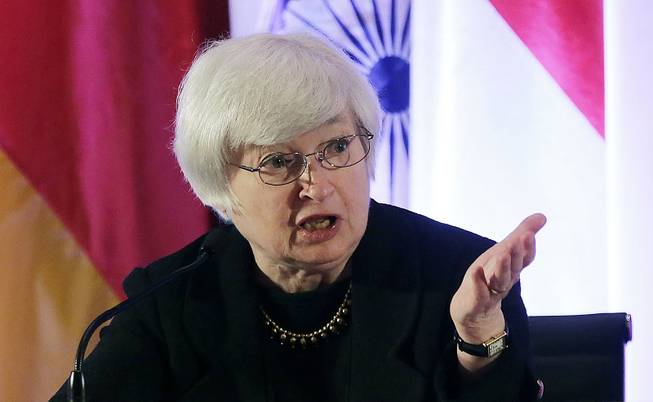
ASSOCIATED PRESS
Janet Yellen, vice chairwoman of the Board of Governors of the Federal Reserve System, answers a question from a participant at the International Monetary Conference in Shanghai, China, June 3, 2013.
Published Wednesday, Oct. 9, 2013 | 11:42 a.m.
Updated Wednesday, Oct. 9, 2013 | 12:13 p.m.
WASHINGTON — The challenges for Janet Yellen if she becomes the next Federal Reserve chair will require both the steely intellect and the personable style that many attribute to her.
Deciding when to slow the Fed's economic stimulus. Forging consensus from a fractious policy committee. Calculating the effects of any economic slowdown from Washington's budget fight. Facing volatile financial markets. Absorbing new members at the Fed.
First, though, Yellen will have to get there: She'll need to overcome Washington's toxic political environment and win confirmation from the Senate.
It's almost enough to make you wonder why she'd want the job.
Yellen is widely seen as a "dove" on Fed policy: She stresses the need to use the Fed's tools to boost growth and reduce unemployment in the sluggish aftermath of the Great Recession, rather than worry about igniting future inflation.
In part for that reason, she's been outspokenly backed by many Democrats in Congress and opposed by some Republicans.
She wasn't President Barack Obama's first choice to lead the Fed. That was Larry Summers, a former Treasury Secretary and chief White House economic adviser who withdrew from consideration in the face of widespread opposition.
Brian Gardner, Washington political analyst for Keefe, Bruyette & Woods, predicts that Yellen, widely respected as an academic economist and veteran policymaker, will be easily confirmed' despite some Republican no votes.
Then the hard stuff begins.
Fed policymakers have been debating when and how to scale back $85 billion a month in bond purchases. The bond purchases are meant to spur economic growth by reducing long-term interest rates, driving up stock prices and encouraging borrowing and spending. Yellen was a key architect of this strategy.
Last month, the Fed surprised financial markets by deciding not to scale back its bond purchases. It concluded that that the U.S. economy wasn't yet healthy enough for the Fed to ease its stimulus even slightly. Fed officials also worried about the budget stalemate that's since led to a partial shutdown of the government and threatens to trigger a default on government debt.
Yellen a Perceptive Forecaster, Not Dovish: Orszag
Many analysts now don't think the Fed will reduce its stimulus before next year. And with the dovish Yellen as chairman, the Fed would likely be cautious about any pullback in early 2014.
For now, there's another problem, too: There isn't much official economic data to go on. The shutdown that began Oct. 1 forced the Labor Department to cancel its all-important jobs report for September. It's still unclear when the jobs report will come out.
The choice of Yellen to lead the Fed also comes amid worry and uncertainty about how much damage the shutdown might cause a fragile U.S. economy. Graver yet is fear that lawmakers won't raise the government's borrowing limit this month. If they don't, the U.S government could eventually default on its debt. Another recession and financial crisis could follow.
As chairman of the Fed, an independent agency that steers clear of Congress' affairs, Yellen can be little more than a spectator.
"There's really nothing she could do about the debt ceiling," notes Joseph Gagnon, senior fellow at the Peterson Institute for International Economics.
Yellen would also take over the Fed at a delicate time for China, the world's No. 2 economy after the United States, and other developing nations.
The International Monetary Fund, citing slower growth in China, India and Brazil, this week reduced its forecast for global economic growth to 2.9 percent this year and 3.6 percent in 2014. Both are 0.2 percentage point weaker than the IMF's previous forecast in July.
Investors have been pulling money out of developing markets, partly to take advantage of rising interest rates in the United States. The Fed might be called upon to help calm worldwide financial volatility.
"The role of the Fed chair is so critical," says Greg McBride, senior financial analyst at Bankrate.com. "We're not just talking about the U.S. economy. We're talking about the global economy."
Yellen will also have to establish herself as chair at a time when the Fed is experiencing unusual turnover. When Bernanke leaves Jan. 31, but there could be up to four vacancies that Obama would need to fill on the seven-member Fed board.
One board member, Elizabeth Duke, left in August. Another, Sarah Bloom Raskin, has been nominated by Obama to become deputy Treasury secretary. The term of a third, Jerome Powell, will be up Jan. 31, though he can remain on the board until a successor is confirmed by the Senate.
And Sandra Pianalto, president of the Federal Reserve Bank of Cleveland, has announced that she will leave early next year.
Most analysts say they're confident Yellen can handle the many challenges.
She's "a good choice," McBride says. "You want your Fed chairperson to be cool, calm and collected and a steady hand. Yellen is certainly that."

Join the Discussion:
Check this out for a full explanation of our conversion to the LiveFyre commenting system and instructions on how to sign up for an account.
Full comments policy